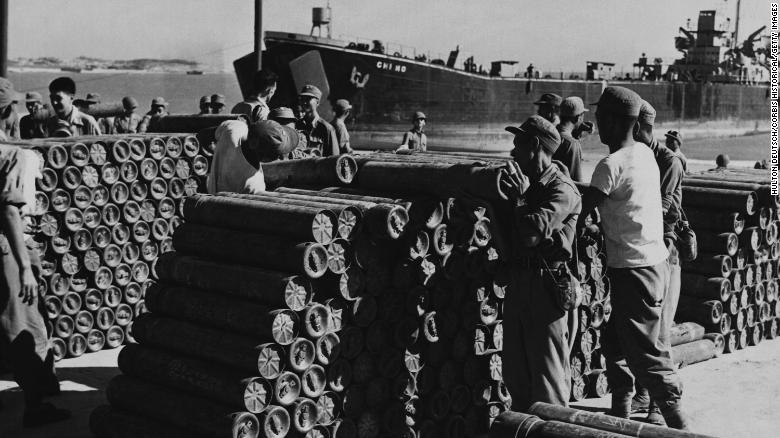Military tension between China and Taiwan increases 0:30
Hong Kong (CNN) -
Military planners in Washington pressured the White House to enlist plans to use nuclear weapons against mainland China during the 1958 Taiwan Strait crisis, recently leaked documents appear to confirm.
The documents, first reported by The New York Times on Saturday, reveal the scope of Washington's discussions on the use of nuclear weapons to deter a Chinese invasion of Taiwan, including acceptance by some US military leaders of possible retaliatory nuclear strikes against US bases.
Nationalist Chinese soldiers on the island of Quemoy, which became the focus of an artillery barrage from mainland China in 1958.
The new information was provided to the newspaper by Daniel Ellsberg, the whistleblower who in 1971 leaked the Pentagon Papers detailing the duplicity of the United States government in its handling of the Vietnam War.
"The first use of nuclear weapons by the United States should not be contemplated, prepared or threatened anywhere, under any circumstances, including the defense of Taiwan," Ellsberg said in a post on his Twitter on Sunday.
China sends warplanes near Taiwan 0:43
The Taiwan leak comes from previously classified sections of a 1966 report by the Rand Corporation think tank on the 1958 Taiwan Strait crisis, written by MH Halperin for the Office of the then Under Secretary of Defense.
After the Communist Party seized power in mainland China in 1949, following a brutal civil war, the Nationalist government fled to Taiwan.
But Beijing viewed the island as part of its territory, and the two sides clashed on and off for the next several decades.
advertising
The closest the United States and China came to an armed conflict was during the Taiwan Strait crisis in 1958, when the People's Republic of China fired artillery at the outlying islands of Taipei.
Washington was concerned that the bombing could be a precursor to an all-out invasion.
The bombardment targeted the Quemoy and Matsu island groups, which lie between Taiwan and mainland China and which Rand Corporation describes as Taipei's "first line of defense."
Although it is already public knowledge that the Eisenhower administration debated using nuclear weapons to deter China from attacking Taiwan, the documents appear to reveal for the first time the scope of the planning.
According to the leaked documents, some officials in the US Department of State and Defense were concerned that the loss of the outlying islands in 1958 could lead to a "takeover of Taiwan by the Chinese Communists."
In the event of an air and sea attack on the islands, US Air Force General Nathan Twining said the United States would have to use nuclear weapons against Chinese air force bases "to prevent an air interdiction campaign. successful, "beginning with" ten to fifteen kilotons of nuclear weapons. "
If this did not lead to a break in the assault from mainland China, "the United States ... would have no alternative but to carry out nuclear strikes deep in China as far north as Shanghai."
According to the documents, the chairman of the Joint Chiefs of Staff acknowledged that this would "almost certainly" lead to nuclear retaliation against Taiwan and the US military base on Okinawa in Japan.
"But he emphasized that if the national policy is to defend the islands near the coast, then the consequences must be accepted," the document says.
Is the US using Taiwan to provoke China?
4:32
Since China had yet to develop its own nuclear capabilities, any nuclear retaliation would have come from the Soviet Union, possibly sparking an even more devastating global conflict.
The report said it is unclear where the nuclear retaliation would have originated.
The document said that the US Joint Chiefs of Staff, and Twining in particular, viewed the use of atomic weapons as "inevitable."
In one section, General Laurence S. Kuter, the Air Force's top commander for the Pacific, states "flatly" that any US air action against a Chinese attack on the outlying islands "had no chance of success unless they were used. atomic weapons from the beginning. "
In the end, Eisenhower was hesitant to use nuclear weapons and lobbied for US troops to stick to conventional weapons.
Joshua Pollack, editor of the Nonproliferation Review, said on Twitter Sunday that the idea that the United States had risked a nuclear trade with the Soviet Union for islands with no "military value" was "jarring."
Soldiers stack artillery shells at the Quemoy Island seaport in 1958, at the time of the Taiwan Strait crisis.
"It's no wonder the White House said no," he said.
On October 6, 1958, a ceasefire was reached in the Taiwan Strait, although there have been ongoing tensions between Beijing and Taipei.
In a speech in January 2019, Chinese President Xi Jinping warned that he would use "all necessary means" and not "renounce the use of force" to return Taiwan to mainland China.
Beijing claims full sovereignty over Taiwan, a democracy of nearly 24 million people located off the southeast coast of mainland China, even though the two sides have been ruled separately for more than seven decades.
With military tensions rising again between the United States and China, whistleblower Ellsberg said in his interview with The New York Times that he had provided the documents because of his concerns about the possibility of a new war on Taiwan.
On Sunday, Ellsberg took to Twitter to ask both parties to exercise restraint.
"Note to @JoeBiden: Learn from this secret story and don't repeat this madness," he said.
Nuclear weapons taiwan

